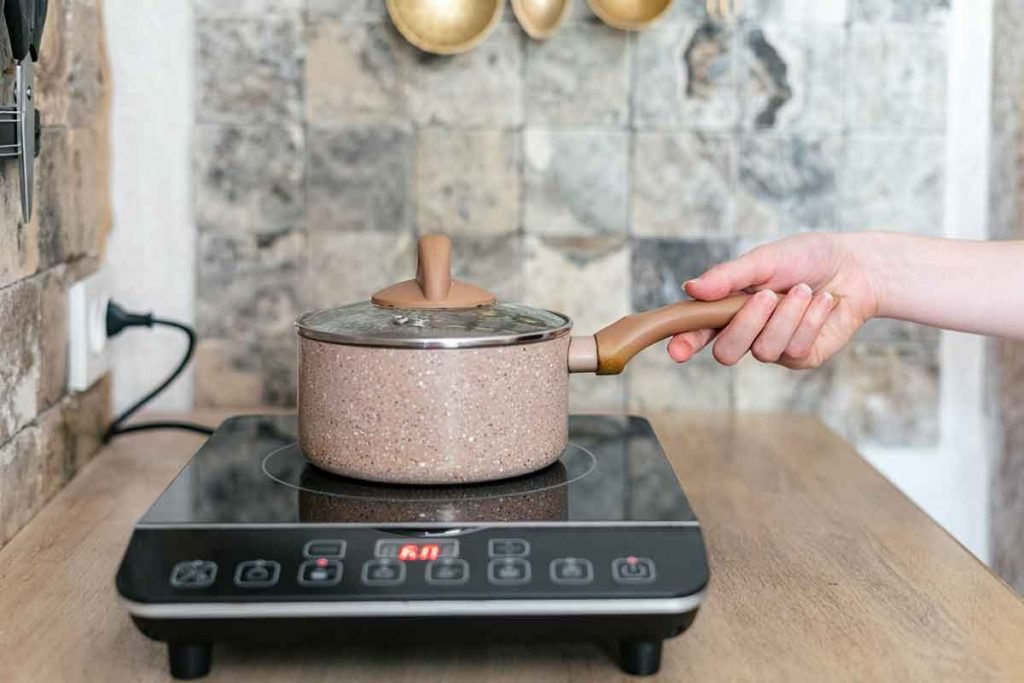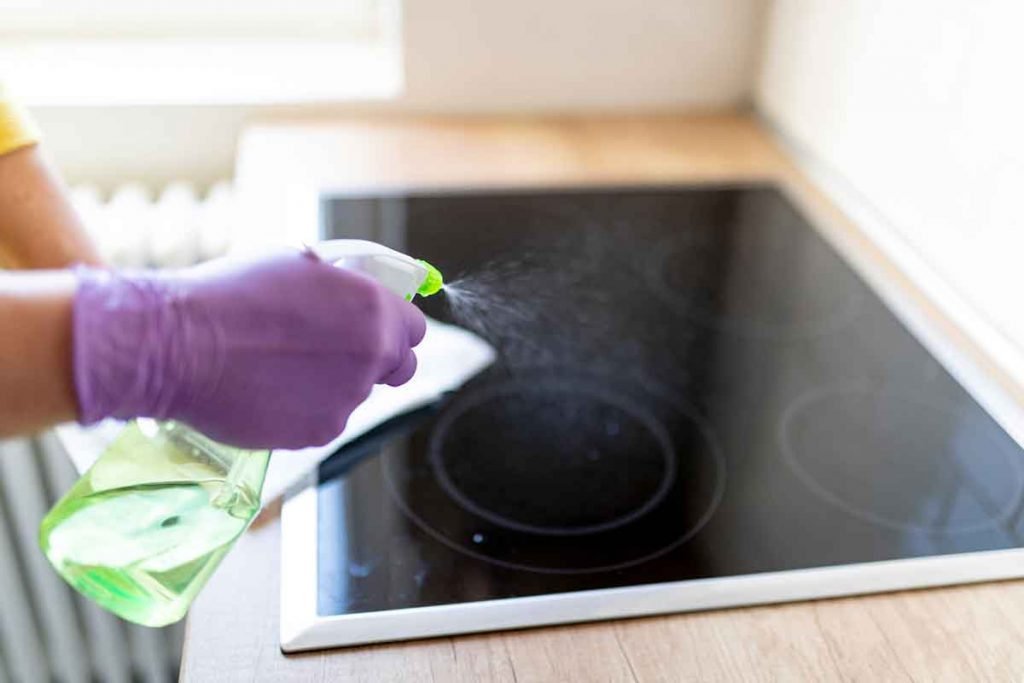You’re done cooking your dinner and head to the dining table, forgetting to switch off your induction cooktop. What will happen next? Will it shut off automatically, or is there any health issues or risk of a fire? These are common concerns that might cross your mind if you accidentally leave your induction stove on.
You see, induction cooktops are a new technology, and it’s common for someone to forget to turn it on after preparing a meal. But don’t worry, if you leave your induction stove on and forget to turn it off after preparing a meal, it will automatically shut down. That’s just how they are built.
Can induction hobs cause fire? Click here to learn more.
Let’s dig deeper and look at this situation from different angles.
What Happens if You Forget to Turn Off Your Induction Hob?
We all have those moments when we get distracted and forget to switch off the stove after cooking. So, what happens if you leave your induction hob on? Here are the features that make it safe to leave the induction hob on:
-
Automatic Shut-Off Feature
Most modern induction hobs come equipped with an automatic shut-off feature, a crucial safety measure. After a certain period of inactivity, the induction hob will automatically turn off, reducing the risk of accidents. The duration before automatic shut-off can vary among different hob models, typically ranging from 1 to 4 hours.
-
Pan Detection
Induction hobs work by creating an electromagnetic field that heats the cookware directly. If you forget to place a compatible pot or pan on the hob, it won’t generate any heat. Many induction hobs have a pan detection feature, which means they won’t activate until they sense the presence of suitable cookware. This safety measure prevents the hob from heating up accidentally and minimizes energy wastage.
-
Residual Heat Indicators
Even after turning off the induction hob, it may remain slightly warm due to residual heat from the cooking process. To alert users about the presence of residual heat, many induction hobs are equipped with residual heat indicators. These indicators display a symbol to indicate which cooking zones are still hot. This visual reminder helps prevent accidental burns and reminds users to avoid touching or placing anything on the hob until it has cooled down.
-
Overheat Protection
Induction hobs are designed with built-in overheat protection systems to prevent damage to the appliance and mitigate fire risks. If the hob’s internal temperature rises to an unsafe level, the overheat protection system will automatically shut off the power to the hob. This feature ensures that the hob remains within a safe temperature range during operation.
Wrapping Up
Forgetting to turn off your induction hob is a common oversight, but modern hobs are designed with various safety features to protect you and your home. The automatic shut-off, pan detection, residual heat indicators and overheat protection collectively contribute to a safe cooking environment. By understanding and utilizing these safety measures, you can enjoy the benefits of cooking with an induction hob while ensuring your kitchen remains accident-free.
Despite these advanced safety features, it’s crucial to remain vigilant and practice good cooking habits. Always make a habit of double-checking that you have turned off the induction hob after each use. Additionally, avoid leaving flammable objects or materials near the hob, even when it’s turned off, to further minimize any potential risks.
Will an Induction Hob Get Damaged if Left on for a Long Time Without a Pan?
Leaving an induction hob on for a long time without a pan can potentially cause damage to the hob, although modern induction hobs like kitchenaid are designed with safety features to shutt off if not in use or minimize the risks.
When an induction hob is left on without a compatible pan in the cooking zone, it can lead to several issues:
- Overheating – Induction hobs generate heat by creating an electromagnetic field that heats the cookware directly. Without a pan to absorb and disperse the heat, the cooking zone can become excessively hot, leading to overheating of the induction coils and other internal components.
- Sensor Malfunction – Some induction hobs have sensors that detect the presence of cookware. If there is no pan in the cooking zone, the sensor may not function correctly, leading to potential errors in the hob’s operation.
- Energy Wastage – Operating an induction hob without a pan is an unnecessary waste of energy. The hob will continue to draw power from the electrical supply, leading to higher electricity consumption.
Prolonged exposure to high temperatures without proper heat dissipation can cause damage to the induction hob’s electronic components, leading to a malfunction or reduced lifespan of the appliance. If the hob senses that there is no compatible pan in the cooking zone or if there is no cooking activity for an extended period, it may automatically shut off to prevent overheating and unnecessary energy consumption.
Is it Okay to Leave a Pan on the Induction Cooktop After Use?
Leaving a pan on the induction cooktop after use is generally safe, but as a responsible cook and homeowner, it’s important to be cautious. Here’s what usually happens:
- After cooking, the pan and the induction cooktop surface will retain residual heat. While induction cooktops cool down faster than traditional gas or electric stoves, the pan may still be hot enough to cause burns if touched. To avoid accidental burns, it’s best to use caution and refrain from touching the pan or the cooktop until they have cooled down.
- Leaving a pan on the induction cooktop after use can lead to unnecessary energy consumption. The residual heat in the pan will dissipate slowly, consuming electricity in the process. To conserve energy, it’s a good practice to remove the pan from the cooktop once you are finished cooking.
- Prolonged contact between the pan and the induction cooktop surface may cause minor wear or scratches over time. While most induction cooktops have durable glass or ceramic surfaces, it’s best to avoid excessive friction or dragging of heavy pans to preserve the stovetop’s appearance.
To optimize safety and energy efficiency, follow these guidelines:
- Always remember to turn off the induction cooktop after cooking. This ensures that no heat is generated, and it minimizes energy consumption.
- After cooking, remove the pan from the cooktop to avoid accidental burns and conserve energy.
- Consider using pan coasters or trivets to protect the cooktop surface from direct contact with hot pans. This can help prevent scratches or damage.
- If you have children or pets in the household, be extra cautious about leaving hot pans unattended on the cooktop to prevent accidental burns.
Frequently Asked Questions (FAQs)
Do Induction Stovetops Turn Off Automatically?
Yes, many modern induction stovetops come equipped with an automatic shut-off feature. This safety feature is designed to turn off the induction stovetop after a certain period of inactivity. The duration before automatic shut-off can vary among different stovetop models, typically ranging from 1 to 4 hours. The feature is designed to:
- Reduce the risk of accidents and potential hazards that could arise if the stovetop is left unattended for an extended period.
- Conserve energy and reduce electricity consumption.
How Can I Prevent Accidents When Using an Induction Stove?
To prevent accidents, always turn off the induction stove after cooking and remove the pan from the cooking zone. Avoid leaving flammable materials near the stove, and be mindful of children, elderly people, and pets to ensure a safe cooking environment.
Can I Trust the Safety Features of My Induction Stove?
Most reputable induction stoves are equipped with advanced safety features, such as automatic shut-off, pan detection, and overheat protection. Choose a high-quality stove from a trusted brand and follow the manufacturer’s instructions for safe use.
What Should I Do if I Accidentally Leave My Induction Stove On?
If you accidentally leave your induction stove on, immediately turn it off to prevent any potential hazards. Allow the stove to cool down before touching it, and ensure the cooking zone is clear of any flammable materials.



